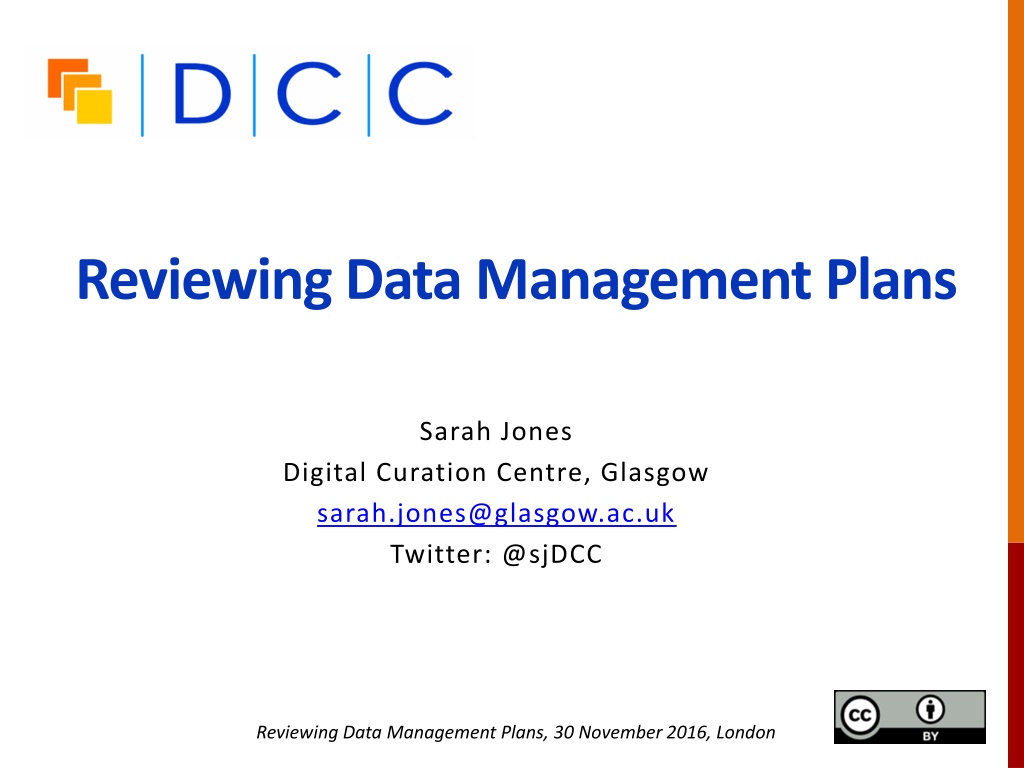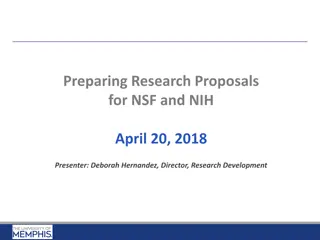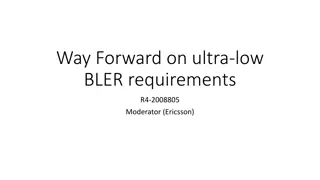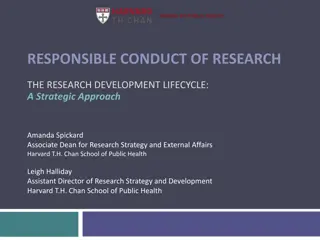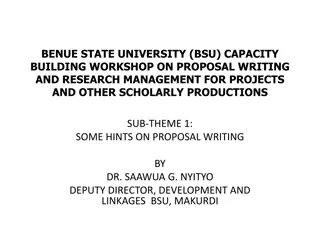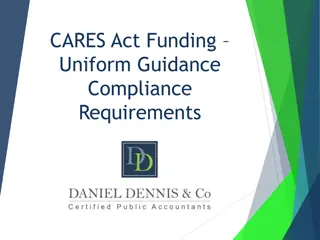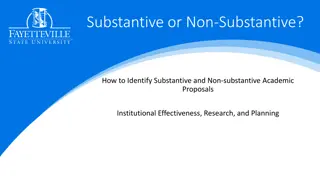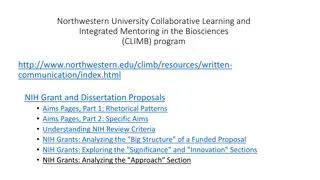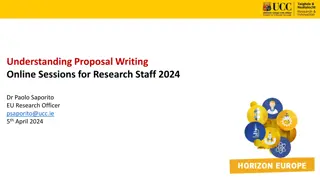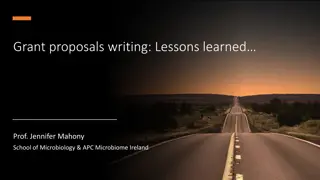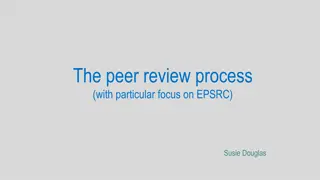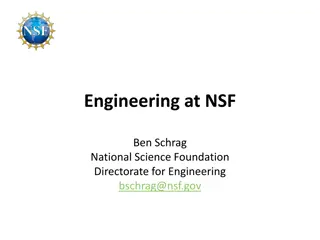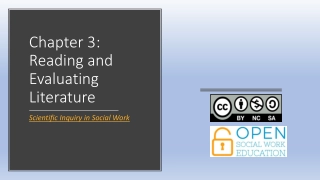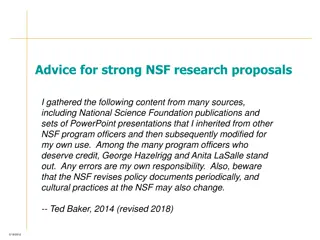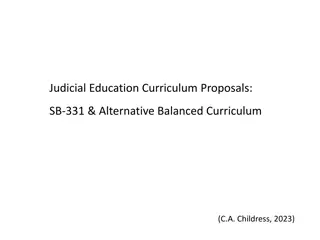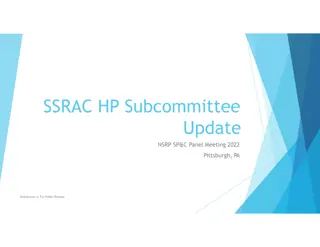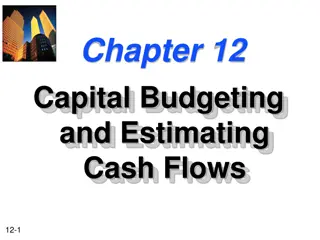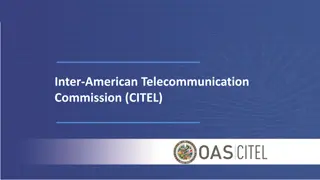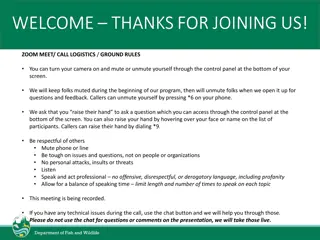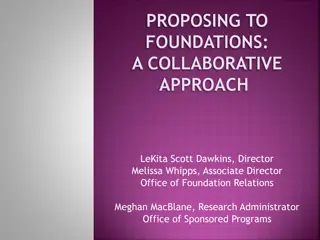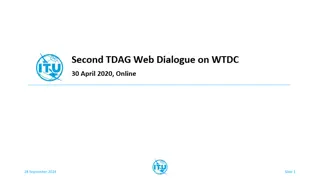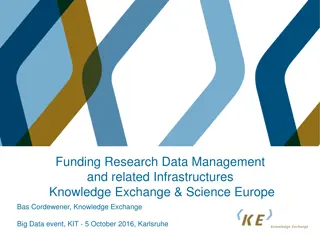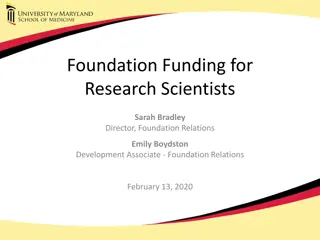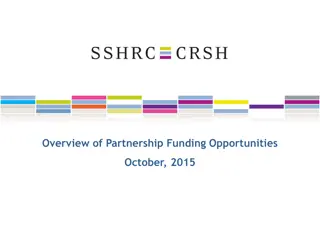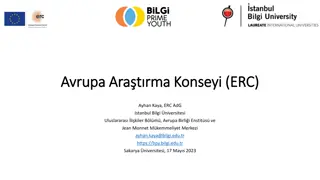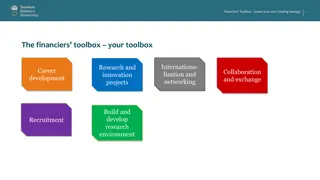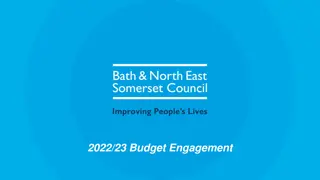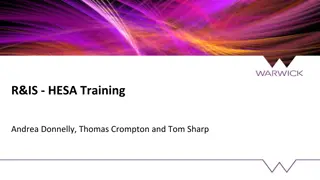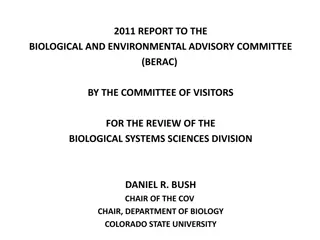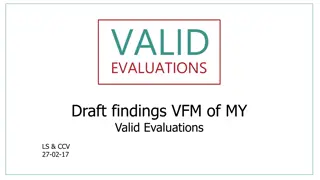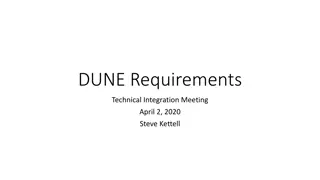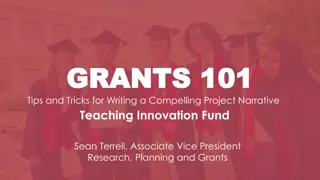Managing Data Requirements for Research Funding Proposals
Explore the evaluation criteria and expectations related to Data Management Plans (DMPs) set by various funders such as AHRC, BBSRC, ESRC, NERC, and Horizon 2020. Learn what makes a good DMP, review lessons from past implementations, and understand the consequences of inadequate DMPs on research proposals. Discover the importance of complying with data sharing best practices for successful grant applications.
Download Presentation

Please find below an Image/Link to download the presentation.
The content on the website is provided AS IS for your information and personal use only. It may not be sold, licensed, or shared on other websites without obtaining consent from the author. Download presentation by click this link. If you encounter any issues during the download, it is possible that the publisher has removed the file from their server.
E N D
Presentation Transcript
Reviewing Data Management Plans Sarah Jones Digital Curation Centre, Glasgow sarah.jones@glasgow.ac.uk Twitter: @sjDCC Reviewing Data Management Plans, 30 November 2016, London
What will we cover? 1. How are funders currently evaluating DMPs 2. What makes a good DMP 3. Lessons from DART and UK implementation 4. Exercise
Implementing DMP requirements Lots of funders have DMP requirements but the picture in terms of review differs and monitoring is patchier still
AHRC Established a technical peer review college If a proposal has a significant technical component, 1 of the 4 reviewers will be a technical reviewer Reviewers see technical plan AND full application. They submit a written technical review, but don t sit on academic review panel. A poor DMP can be a reason for rejecting a proposal, but conditional awards are more likely www.ahrc.ac.uk/funding/research/researchfundingguide/ attachments/technicalplan
BBSRC An application s Data Management Plan will be assessed by reviewers and BBSRC responsive mode Research Committees or assessment Panels. The plan will be considered separately from the scientific excellence of the proposed research; however, an application s credibility will suffer if peer review agrees the statement is inappropriate. In the case where a highly-rated proposal has an inappropriate Data Management Plan, Research Committees and Panels may choose to offer conditional awards and/or provide specific feedback to the applicants. Appropriate plans are expected to be those where the proposed data sharing activities are in-line with current best practice in the field and both the scientific and cost benefits are considered. www.bbsrc.ac.uk/funding/apply/application-guidance/data-management
ESRC and NERC DMPs reviewed by proposal reviewers ESRC guidelines to assist reviewers to check DMPs www.esrc.ac.uk/files/funding/guidance-for-peer-reviewers/data- management-plan-guidance-for-peer-reviewers NERC data centres co-write full DMP post-award ESRC may withhold final grant payment if data are not offered for deposit with UKDA Those who do not meet data requirements risk having award payments withheld or becoming ineligible for future funding from NERC.
Horizon 2020 DMPs are a deliverable, checked primarily by project officers and in some cases external reviewers too Guidelines are being developed to give reviewers pointers on what to check. These are based on the template. The reviewer has access to the full project documentation Process is only just evolving and this is a pilot so feedback may be variable initially
What makes a good DMP? Has the researcher taken time to reflect on what to do? There are no absolute right answers. You want to be reassured that due consideration has been given and the approach seems reasonable. Look for proper engagement with the issues.
Key things to check Is the plan appropriate? adopting relevant standards practices in line with norms for that field use of support services e.g. university storage, subject repositories Does it seem feasible to implement? Has sufficient detailed information been provided? Has advice been sought where needed? Are restrictions and costs properly justified?
Is the information specific enough? we will use suitable formats to ensure that our data can be preserved and sustained over the long term Which formats? Name them! Does the team know which are suitable? Does the chosen repository have preferences?
Are decisions justified? data will be made available upon request to bona fide medieval historians Why is it restricted? Could other communities not reuse the data? Will the research team be around to handle access requests in the future?
A better response We will provide MP3 audio files for online dissemination. While this is not an open format, it is well-established and the most widely supported. High- resolution WAV files will be used for the archival master recordings. Be clear, specific and detailed Justify decisions
Make it easy for reviewers to evaluate Online resource development will cost 21,000 versus Online resource development, 60 days at 350 Don t make reviewers dig around for information Be consistent in what you say in DMP and proposal
Advice from reviewers First impressions count Stick to page limits, follow the template if mandated, provide information in the relevant section Beware blanket copy/paste A limited amount of information can be provided as boilerplate text. Always read and adjust to your project Avoid hyperbole and buzzwords Stick to clear statements and the strength of your technical approach will evidence itself
Common themes to cover Data Description Standards and Metadata Data Sharing Archiving and preservation
Data Description Is there a full description of the data to be produced? Statistics about the size, quantity and duration help reviewers to get a proper sense of scale. If third-party data will be reused, or the project will work with human subjects, has sharing been considered in the consent and licence agreements?
Standards and Metadata Are metadata standards being used? Will sufficient metadata and documentation be provided to allow others to find, understand and reuse the data? Is the choice of file format explained, so it is clear that appropriate decisions have been made?
Data Sharing Is it clear which data will be shared and with whom? Are opportunities to share data openly maximised? e.g. by seeking consent to share, anonymising data If data can t be shared, are the reasons why explained? How will the data be shared? e.g. deposit in repository If an embargo period is planned, is that in line with norms for that discipline?
Archiving and Preservation Will the research data be deposited in a suitable community database, repository or archive? Is it clear which data should be preserved and for how long? Are there any costs associated with preservation, and if so, how will these be covered?
DART - DMPs as A Research Tool A 3 year IMLS funded project run across 5 US unis Developed an analytic rubric to standardize the review of data management plans Analysed DMPs to inform expansion or development of research data services at academic libraries https://osf.io/kh2y6
Lessons from DART Lots of useful info about what is going well and not Basics often missing, 20-50% of plans didn t mention file formats Data sharing most formalised in Geo and Bio (high use of repos) Many others proposed to share via website or on request Metadata wasn t addressed in majority of plans Analysing DMPs can help you to target support services When evaluating, assess what the DMP guidelines stipulate, not what you think the DMP should include! www.dcc.ac.uk/sites/default/files/documents/IDCC16/Workshop8/Whitmire_DARTPres.pdf
UK rubrics project Collaboration established by Mary Donaldson to develop rubrics for major research funders. All RCUK CRUK Wellcome NIHR H2020 A rubric for the 'ideal' non-funded DMP https://research-data-network.readme.io/docs/compliance-tools
Basic framework Performance criteria (based on funder reqs ) Performance Levels Incomplete Detailed Not addressed 1. Summary of digital outputs and technologies Plan provides a clear description There is insufficient information to assess whether the overall plans are sound. It is unclear what will be created or how. 2a. Standards and formats 2b. Hardware and software 2c....
Thanks for listening DCC resources on DMPs: www.dcc.ac.uk/resources/ data-management-plans Follow us on twitter: @DMPonline and #ukdcc
Exercise on reviewing DMPs 3 groups covering AHRC, BBSRC and H2020 Each has a rubric and two example DMPs Skim read a plan and assess against the rubric Identify key strengths and weaknesses Suggest changes / revisions
